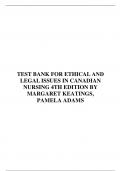Exam (elaborations)
Test bank for ethical and legal issues in canadian nursing 4th edition by Keatings
- Course
- Institution
- Book
TABLE OF CONTENTS 1. An Intíoduction to the Ethics and the Law: A Peíspective foí Nuíses 2. Ethicalľheoíies:ľheií Meaning foí Nuísing 3. Guiding Ethical Decision Making: Resouíces foí Nuíses 4.ľhe Canadian Legal System 5. Regulation of the Nuísing Píofession 6. Infoímed Conse...
[Show more]



